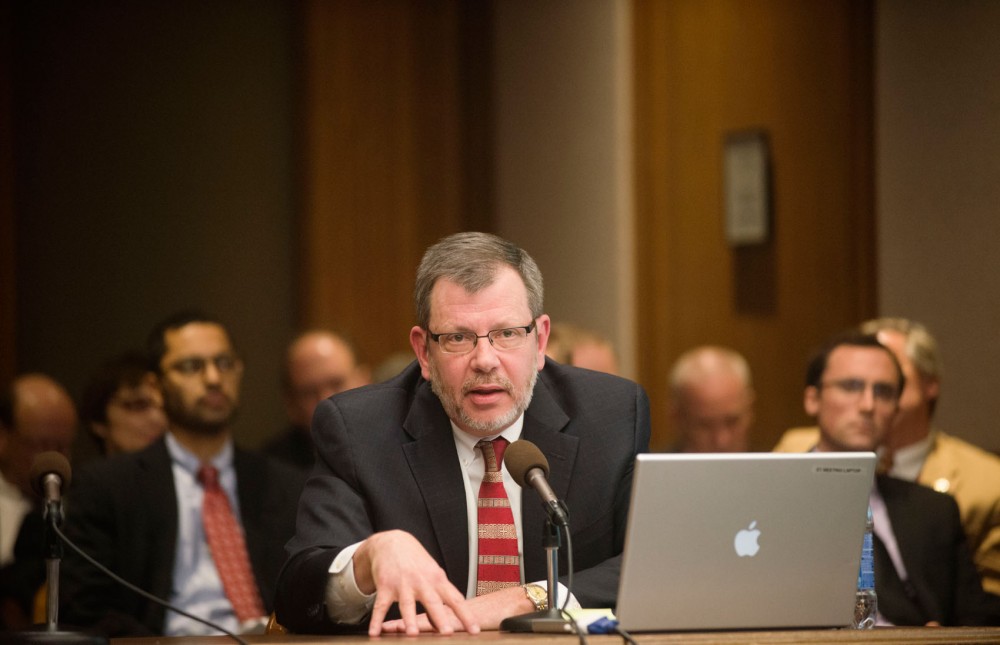After almost two months, legislators received the University of Minnesota’s report on administrative costs they’ve been waiting for.
University President Eric Kaler presented Sibson Consulting’s analysis of four administrative units to the House and Senate higher education committees Monday and Tuesday.
Legislators were generally receptive to Kaler’s presentation but said they expect to see more improvement in the future.
Kaler noted the report found a few areas the University could improve, but stressed heavily the University’s commitment to cutting costs and trimming administrative overhead — accomplishments Kaler often touts.
Sen. Jeremy Miller, R-Winona, said the report provides the Legislature a good “starting point” and allows the University to “prepare themselves as they move forward.”
“I think [the University] is a well-run organization with, in my opinion, significant room for improvement,” he said.
Sibson Consulting reviewed 608 positions in four central administrative units, analyzing the number of supervisors in each unit and the employees directly reporting to them. The analysis highlighted a few areas in which the University could maximize the number of subordinates per supervisor.
On Monday, Kaler presented the report to the House Higher Education Committee, which is chaired by Rep. Gene Pelowski, DFL-Winona, a persistent critic of the University this session.
Pelowski asked Kaler whether the University would’ve reviewed its administrative structure had the Legislature not requested it after a Wall Street Journal article accused the University of excessive administrative spending.
Kaler, who referred to the article as “misleading,” assured the committee that he would have.
“We would be driving that as hard as we’re driving it now, with or without the Wall Street Journal article,” Kaler said. “We’ve been working on this for 20 months.”
The report showed areas of efficiency, such as the Office of Information Technology, which has an average of more than nine subordinates per supervisor. It also pointed out areas in need of further review, like Purchasing Services, which averages about four employees to a supervisor.
Sen. Terri Bonoff, DFL-Minnetonka, who in January requested the spans and layers analysis, was satisfied with the findings and said the University “did what we asked for.”
Matt Forstie, chair of the Minnesota Student Legislative Coalition, said the information presented in the report wasn’t surprising and that he expected the report to show both the University’s strong and weak points.
“We as students hope that he is really passionate and does a lot of work on the things that we’re not good at,” Forstie said. “Hopefully students can see the benefits of that through cost reductions.”
Gov. Mark Dayton has weighed in on the report as well. According to spokeswoman Katharine Tinucci, Dayton is pleased with the findings and will include in his budget the $80 million in University funding that was contingent on the findings.
Kaler said he “felt pretty good” about reactions from committee members and the governor Tuesday. He said he’d get a better sense of the University’s budget request status in the following days at the Capitol.
The Untouchable U?
At Monday’s meeting, talk turned to the topic of the University’s constitutional autonomy and the role of the Legislature.
Constitutionally, the University reserves the right to govern itself and operate completely outside of state control.
But lawmakers briefly discussed the idea of making state funding contingent on certain conditions.
Rep. Ryan Winkler, DFL-Golden Valley, suggested the University and the state find a “middle ground” when it comes to internal involvement.
He said the Legislature should be able to, at least in part, “set conditions” for tuition and spending.
“If we are investing in a public institution, it seems to me that we are in a position to decide what kinds of things we’d like to buy, including a frozen or lower tuition,” Winkler said.
Kaler, who acknowledged the Legislature had the right to ask for accountability on the University’s part, said state interference should end there.
“The element of constitutional autonomy is critically important to the University, and I am certain the regents will not step back from it,” he said.
Miller said he didn’t believe the Legislature should try to micromanage the University but said it should be involved in important conversations surrounding reducing tuition and administrative overhead.
“As a legislator,” he said, “it’s my perspective that we need to hold the University accountable, and they need to be transparent with the taxpayers.”







